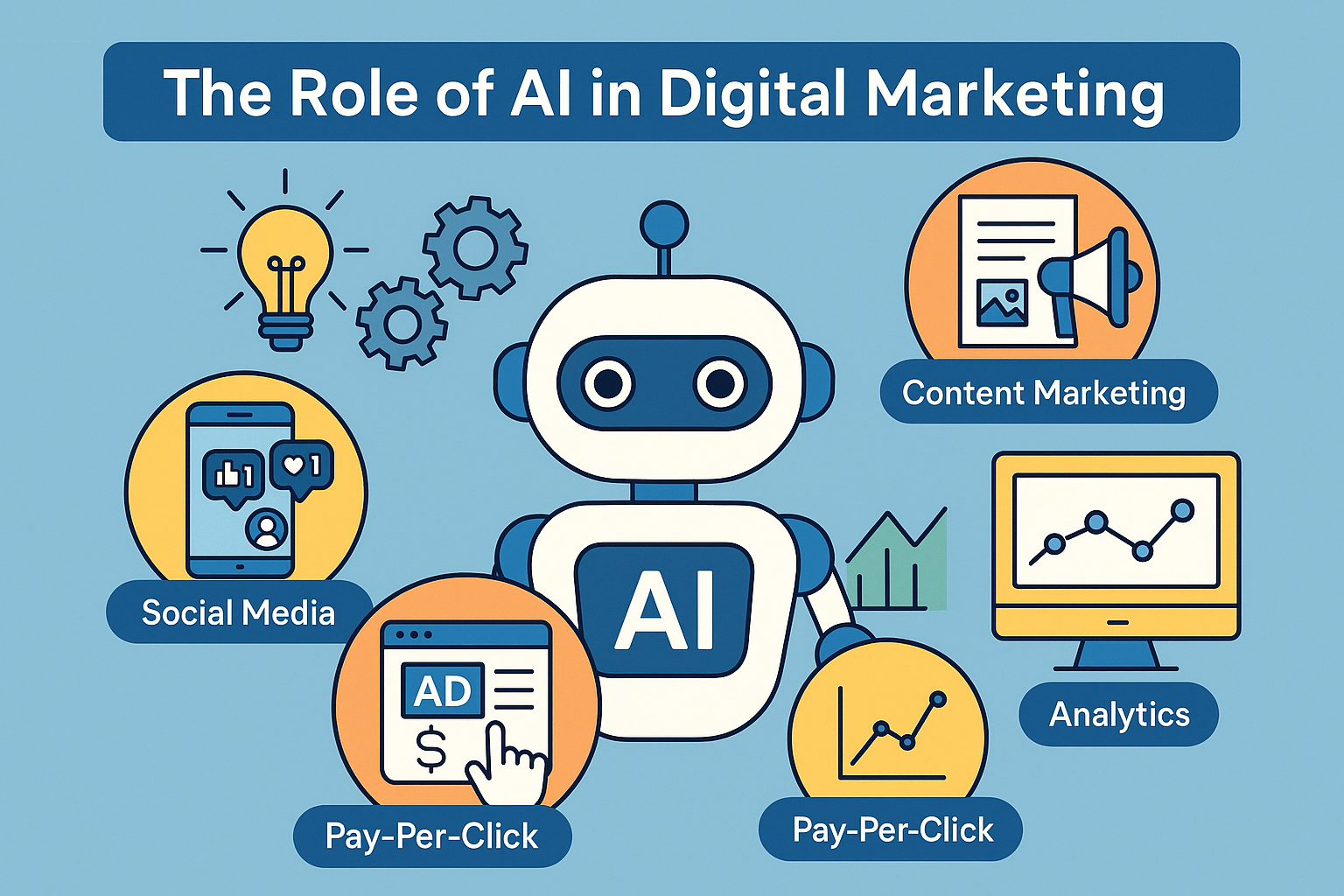In today’s fast-paced digital ecosystem, marketers face the constant challenge of staying ahead of consumer expectations, competitors, and technological changes. Among the most transformative forces reshaping digital marketing today is Artificial Intelligence (AI). Once considered futuristic, AI has become a practical and powerful tool that’s redefining how brands connect with their audiences.
From personalized recommendations and automated content creation to predictive analytics and chatbots, AI is not just enhancing marketing strategies — it’s revolutionizing them.
1. Hyper-Personalization at Scale
Personalization has long been a marketing goal, but AI takes it to an entirely new level. Traditional personalization relies on basic customer segmentation, such as age or gender. AI, on the other hand, leverages real-time behavioral data, purchase history, browsing patterns, and even sentiment analysis to deliver hyper-personalized experiences.
For example, AI-powered recommendation engines like those used by Amazon or Netflix analyze vast datasets to suggest products or content tailored to individual users. This level of precision dramatically increases engagement and conversion rates.
Key takeaway: AI enables brands to create one-on-one marketing experiences at scale — something manual processes could never achieve.
2. Predictive Analytics and Customer Insights
Understanding customer behavior is at the heart of effective digital marketing. AI enhances this by using predictive analytics — the ability to forecast future consumer behavior based on historical data.
With tools like Google’s AI-driven analytics, marketers can predict which users are more likely to convert, churn, or engage. This allows for smarter allocation of marketing budgets and better-targeted campaigns.
AI can also cluster audiences into meaningful segments that go beyond traditional demographics, helping marketers uncover hidden patterns and trends that influence buying decisions.
Example: An e-commerce brand might use AI to identify a segment of users who abandon carts but later return to make a purchase when offered a discount — and then automate that entire journey.
3. Automated Content Creation and Optimization
AI is now capable of creating and optimizing content across platforms. Natural Language Generation (NLG) tools like Jasper, Copy.ai, and even ChatGPT can write emails, product descriptions, social media posts, and ad copy within seconds.
More importantly, AI doesn’t just generate content — it also learns from how users interact with it. Tools like Persado analyze emotional triggers in language to craft the most effective messaging for a given audience, leading to higher engagement.
AI is also invaluable in SEO. It helps identify keywords, optimize website structures, and even predict the success of content before it’s published.
4. Chatbots and Conversational Marketing
Chatbots have moved beyond basic customer service to become a vital component of conversational marketing. AI-powered chatbots offer 24/7 support, qualify leads, and guide users through the sales funnel — all in real time.
Thanks to Natural Language Processing (NLP), today’s chatbots understand context, tone, and intent, providing human-like responses that enhance customer satisfaction.
Example: A fashion retailer might use a chatbot to help users find the perfect outfit based on occasion, size, and budget — improving both UX and sales.
5. AI-Powered Advertising
Programmatic advertising, which uses AI to automate media buying in real-time, is one of the most impactful applications of AI in digital marketing. It allows advertisers to bid for ad space dynamically and show ads to the right users at the right time and place.
Platforms like Google Ads, Meta Ads, and TikTok now use AI to optimize campaigns automatically, adjusting targeting, creatives, and budgets to achieve the best ROI.
AI also powers dynamic ad creatives, which automatically adjust visuals and copy to resonate with specific audience segments — increasing click-through and conversion rates.
6. Voice Search and Visual Recognition
As more users interact with devices through voice (e.g., Alexa, Siri) and images (e.g., Pinterest Lens, Google Lens), marketers must adapt their strategies accordingly. AI is key to voice search optimization and visual search integration, helping brands appear in non-text-based search results.
For example, AI tools can optimize website content for voice queries, which tend to be longer and more conversational. Similarly, image recognition algorithms help e-commerce platforms allow users to search for products by uploading a photo.
7. Ethical Considerations and the Human Touch
While AI opens new doors, it also raises ethical concerns — from data privacy to algorithmic bias. Marketers must use AI responsibly, ensuring transparency and compliance with data protection regulations like GDPR.
Moreover, while AI enhances efficiency, the human element remains irreplaceable. Emotional intelligence, brand storytelling, and ethical decision-making still require human insight. The future lies in human-AI collaboration, not replacement.
Conclusion: The Future of AI in Digital Marketing
AI is no longer a luxury — it’s a necessity in modern digital marketing. Brands that effectively leverage AI will be able to deliver smarter, faster, and more relevant experiences across the entire customer journey. Whether it’s through automation, personalization, or analytics, AI empowers marketers to work more efficiently and make data-driven decisions with confidence.
However, the most successful strategies will combine AI’s power with human creativity and empathy. In doing so, marketers can build deeper, more meaningful connections with their audiences in a digital-first world.

